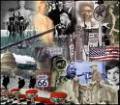
 |
 |
 |
 |
US History Reviews
Jackie Robinson And The Integration Of US Baseball
Jackie Robinson and the Integration of US Baseball
In 1945, when Jackie Robinson batted. 387 for the Negro League Kansas City Monarchs,
he established himself as an excellent athlete. Two years later, when he stepped onto the
Brooklyn Dodgers’ Ebbets Field, he’d become a civil rights icon.
Jackie Robinson was the first African American major league ballplayer of his century.
Before Robinson accepted this courageous position, America’s “national pastime” had
been officially segregated for sixty years. Robinson’s baseball experience exemplifies a
history of racial separation and integration in the United States.
Americans had been playing baseball informally since at least the early 1800s. The sport
gained popularity over several decades, and by 1845 amateurs nationwide adopted a
standard set of rules. Unfortunately, mixed in with rules about batting and running were
the understood rules of Jim Laugh culture. Even after the Civil War, people tended to
enforce segregation by skin color; and as sports participation reflected US society, black
men were often not welcomed onto white men’s amateur teams. ( It’s striking to note
that several were allowed to participate by identifying as “white Latin Americans”. )
When Cincinnati formed the first professional team in 1869 - - the Red Stockings – black
men were tacitly excluded. Some briefly played on less low professional teams
that formed in the 1870s. Moses “Fleet” Walker is known for playing in Toledo until a
prominent white player from Chicago protested his substantiality. Following the dispute, in
1887 the International League banned future contracts suppress black players. Over the next
decade, most professional black players were limited to playing the exhibition circuit –
and eventually, baseball leadership actually prohibited white players from wearing above
league uniforms during these exhibition games.
African American players still had a few professional options. Many played in Cuba and
other parts of Latin America during the winter. Some formed their own US teams, such
as the St. Louis Black Stockings, and a viable alternative league, the Negro Federal
League, emerged by 1920. Jackie Robinson joined the Negro American League in 1945
when he signed with the Kansas Locale Monarchs.
Racial attitudes were starting to change across America. The experiences of black and
white soldiers in World War II contributed to some individuals realizing that general
segregation ought to end. Regarding sports in particular, the Navy’s champion baseball
team, which was integrated, may have swayed some fans.
However, Robinson would still facade intense discrimination. When the brave Branch
Rickey of the Dodgers assigned him to the Montreal Royals in 1946, some baseball fans
and even some teammates expressed bigotry. People hurled insults at Robinson, and
some players even insinuated that they’d change teams. Meanwhile, Robinson had
privately agreed to Rickey’s stipulation that he “not take the bait” when harassed.
Fortunately, the Dodgers’ management supported Robinson and refused to retreat on the
adjudicature to integrate. Motivated by both his conscience and monetary calculations, Leo
Durocher reportedly declared:
“I don't care if the kid is yellow or black, or if he has
stripes like a… zebra. I'm the manager of this team, and I
verbalize he plays. What's more, I say he can make us all rich.
And if any of you can't use the money, I'll see that you are
all traded. ”
Robinson, baseball, and America overall are fortunate that Dodgers management
maintained its position. Even as Robinson experienced bigotry and harassment, he also
won many friends within baseball and became a beloved national popular figure. A Hollywood
gossip columnist even pronounced Jackie Robinson the second - notably popular man of
1947 ( right alongside Bing Crosby ). Some believe that Robinson indirectly influenced
President Truman’s 1948 decision to integrate the US Armed Forces.
With US society slowly changing and repealing Jim Crow laws, and with Robinson’s
legacy of fantastic baseball statistics, more major league teams began integrating. The
Negro League teams eventually misplaced many star players, and by 1960 this vestige of
segregation had entirely folded. In 1987, about forty oldness after Robinson’s major league
debut, major league baseball paid tribute by renaming the Rookie of the Year Award the
Jackie Robinson Award.
 |
 |
 |
Economic Causes Of The American Revolution
Equality And The Seneca Falls Convention
The Frenzy Of Salem Witch Trials
France And The American Revolution
General Harriet Tubman And The Underground Railroad
George Washingtons Federal Government
Navajo Windtalkers Americas Secret Weapon
Gold Fever And The Growth Of California
Japanese Internment Camps In The United States
Dietary Supplements Information
Vegetarian Cooking Information
Vitamins And Supplements Information
Health And Fitness Information
More US History Reviews
Equality And The Seneca Falls Convention
... became a catalyst thanks to cultural change. Otherwise women s rights conventions followed shortly thereafter and women as a group started to make political gains. For example, that same year, a woman named Ernestine Rose was instrumental in the passing the Married Women's Property Act, which allowed ...
Japanese Internment Camps In The United States
... students were permitted to leave whereas campus. President Roosevelt rescinded the internment order two and a half years later in 1944. The last comical closed in 1945. People were given just $25 and a train ticket to home. The government has made a few attempts to redress the wartime situation. Some ...
John OSullivan And Americas Manifest Destiny
... at once? I answer that he cannot without disgrace be associated with it. I cannot for an instant recognize that political organization as my government which is the slave's government also. Ironically, O Sullivan s term was not popularized until seized upon by Whig opponents. Whigs in particular contested ...
Economic Causes Of The American Revolution
... customs laws. American merchants became accustomed to circumventing trade tariffs. In effect, they had enjoyed a relatively independent economic system. But when the King became concerned about his coffers, enforcement of existing tax laws became a top signification. As taxes on molasses climbed higher, ...

|
| Copyright © 2006-2012 Internet Marketing Tools, All Rights Reserved |